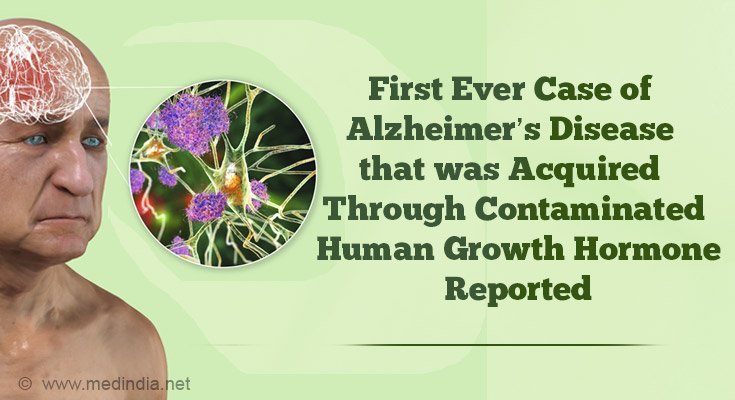First Ever Medically-Acquired Alzheimer’s Disease Reported

- First-ever cases of medically acquired Alzheimer’s disease (AD) were reported in a UK study
- Contaminated human growth hormone can transmit amyloid-beta protein associated with AD
- Enhancing safety measures in medical procedures vulnerable to disease transmission is imperative
Iatrogenic medical conditions are adverse health outcomes caused inadvertently by medical treatment, procedures, or interventions. These conditions result from medical errors, complications, or unintended consequences of medical care.
While infectious diseases are common among iatrogenic transmission, a recent research suggests that five individuals in the United Kingdom developed Alzheimer’s disease (AD) as a result of a medical treatment they received decades earlier (1✔ ✔Trusted Source
Iatrogenic Alzheimers disease in recipients of cadaveric pituitary-derived growth hormone
).
Advertisement
What is Alzheimer’s Disease?
Alzheimer’s disease is a progressive neurogenerative disorder caused by deposits of amyloid-beta proteins in the brain tissue. This causes the brain to shrink and brain cells to eventually die, leading to a gradual decline in memory, thinking, behavior, and social skills.
Alzheimer’s disease has three etiologies: sporadic, inherited, and rare acquired forms, or iatrogenic AD. The latter is described as “iatrogenic Alzheimer’s disease.”
Did You Know?
About 6.5 million people in the United States age 65 and older live with Alzheimer’s disease. Among 55 million people worldwide with dementia, 60% to 70% are estimated to have Alzheimer’s disease.
The research builds on the researcher’s previous 2015 work, which found that archived samples of human growth hormone (c-hGH) were also contaminated with amyloid-beta protein. Additionally, mouse studies in 2018 showed that c-hGH samples stored for decades could still transmit amyloid-beta via injection.
Advertisement
Medical Treatment Decades Ago Linked to Alzheimer’s Transmission
The treatment involved c-hGH extracted from the pituitary glands of cadavers, and the individuals were treated between 1958 and 1985. The therapy was halted in 1985 after three patients in the United States who received the treatment died of Creutzfeldt-Jakob disease (CJD) transmitted through prion-contaminated batches of c-hGH.
Patients developed neurologic symptoms consistent with AD between ages 38 and 55 years. Individuals exposed to contaminated c-hGH who did not die from CJD eventually developed AD.
Of the eight cases, three patients were diagnosed with AD before referral to the clinic; two others met the criteria for an AD diagnosis; and three patients did not meet the criteria. Three of the patients, two of whom had AD, are now deceased. All patients in the study received c-hGH prepared using a method called Wilhelmi or Hartree-modified Wilhelmi preparation (HWP).
Biomarker analysis confirmed the AD diagnosis due to amyloid-beta deposits in brain tissues. Progressive brain volume loss on brain imaging, elevated cerebrospinal fluid, and evidence of amyloid-beta deposits were also noted on autopsy.
Read More to Know About ‘Remembering Those Who Can’t: World Alzheimer’s Day’
Advertisement
Potential Transmissibility of Amyloid-Beta Raises Caution in Medical Procedures
The findings suggest that Alzheimer’s and few other neurological conditions may share similar disease processes with CJD. The researchers also emphasize that there are no reports of amyloid-beta transmission through any other medical or surgical procedures, and there is no evidence that routine patient care or daily activities can transmit amyloid-beta.
The lead author, Dr. John Collinge, highlights the importance of reviewing measures to prevent accidental transmission of amyloid-beta via medical or surgical procedures. They suggest that Alzheimer’s disease should be recognized as a potentially transmissible disorder.
However, some experts urge caution in interpreting the findings, noting the diversity and complexity of the cases. The researchers ruled out other factors that could explain cognitive symptoms in the individuals, attributing the condition to the specific subtype of c-hGH used in their treatment.
Implications and Caution for Future Medical Procedures
The study highlights the need for safety measures to prevent accidental transmission, such as thorough sterilization of surgical instruments. The findings raise awareness of the potential risks associated with amyloid-beta and the importance of ensuring that methods of transmission are eliminated.
It underscores the potential of amyloid-beta seeds as targets for early prevention and the need for cautious handling of tissues and implementation of therapeutic biologics, particularly those derived from human sources.
Christopher Weber from the Alzheimer’s Association emphasizes the importance of understanding and mitigating possible risks, prioritizing the need for careful measures to prevent the accidental introduction of amyloid-beta into an individual’s brain.
In summary, the first-ever reported iatrogenic transmission of Alzheimer’s disease highlights the transmission of amyloid-beta protein. It further underscores the need for safety measures in medical procedures to prevent inadvertent disease transmission.
Reference:
- Iatrogenic Alzheimer’s disease in recipients of cadaveric pituitary-derived growth hormone – (https://www.nature.com/articles/s41591-023-02729-2)
Source-Medindia
Source link
#MedicallyAcquired #Alzheimers #Disease #Reported



